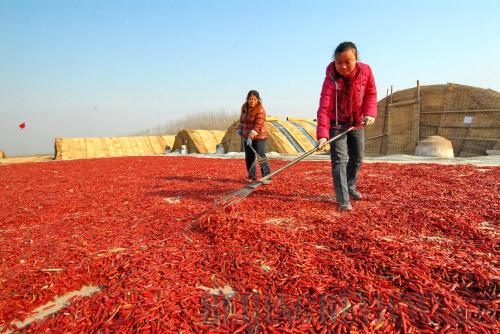|
 |
|
ECONOMIES OF SCALE: Members of a farming cooperative in Linxi County, Hebei Province, dry chili peppers on December 9, 2012 (YANG SHIYAO) |
Du Mingzhen, 60, has been a farmer all his life in Sijiazhuang Township in Shijiazhuang, capital city of north China's Hebei Province, but was overloaded by cultivating his family's hectare of land during the past few years.
"I used to work in the fields all day long with my wife and both of us were always exhausted. We considered renting machinery during the harvest season, but it was too expensive," Du said. "The dilemma really gave me a headache."
Around one year ago, Du transferred the operating rights of his family's land to a local farming cooperative and also works there as a farmhand. "I still work every day, but now I'm finally earning a salary," Du said, adding that his income has increased and become more stable.
After joining the cooperative, Du has received about 10,000 kg of grain annually in return. He also receives a salary from the cooperative as an irrigation technician. The family's income is also supplemented by the pay Du's wife receives from a job in a nearby city.
Du Yongfeng, chairman of the cooperative, said that many farmers in Sijiazhuang have moved to cities to earn a better living since the salaries are much higher than the income from farming their own land. In 2008 he took advantage of the brawn drain to set up the cooperative, which has incorporated more than 15,000 households and nearly 10,000 hectares of land.
The cooperative hires more than 300 people, who were trained for sowing, irrigation and pest control jobs before being assigned to respective posts. All land is farmed according to the same technical standards on crop management and pest control, and workers are required to wear badges with numbers on them to facilitate responsibility tracing if some work is found below standard.
Du Yongfeng said that the training of these employees for their posts and the model of collective farming have greatly increased the output per unit of area while reducing water and fertilizer consumption by 20 percent.
Across China, the boom in farming cooperatives has significantly changed the agricultural production model in the country. In 2012, China had 680,000 rural cooperatives, a 30 percent year-on-year increase, according to the Ministry of Agriculture. They covered more than 46 million rural households, or 18.6 percent of China's total. In Hebei alone, more than 20,000 farmers work for cooperatives.
When 30-year-old Liang Yingkui works in the fields, he often stands out as the only young man among many female and elderly farmers.
One year ago, Liang quit his job as a taxi driver in Shijiazhuang and took up farming work instead in his home village near the city where he was born and raised. His parents joined a local farming cooperative and incorporated the family's hectare of farmland.
"Commercial farming represents a development trend in China, which means that farmers will have a better future," said Liang, who never did any farming before his latest career change. He believes young men will replace elderly people and women as the mainstay of the labor force in the countryside in the future.
| 